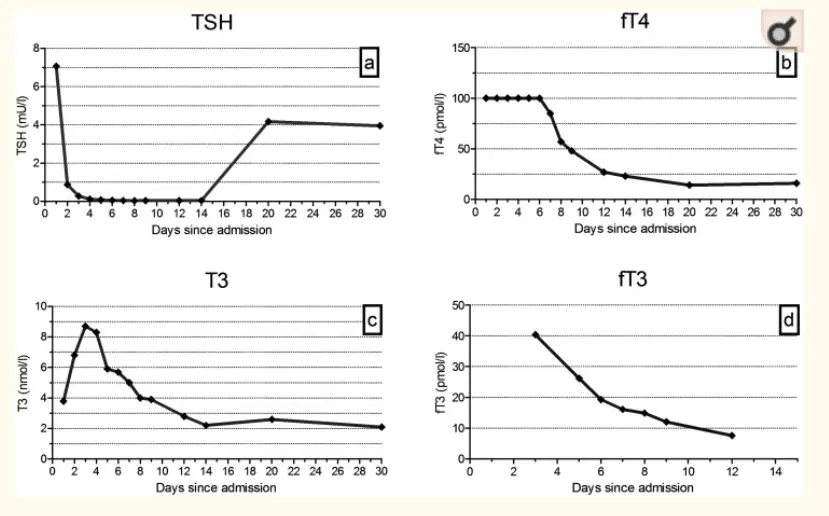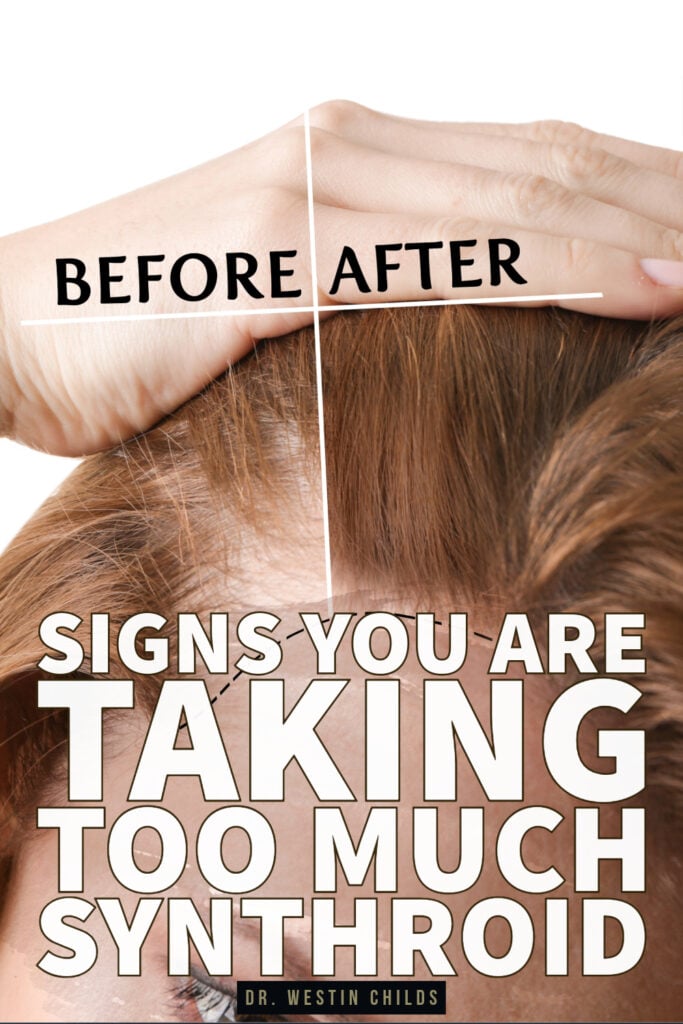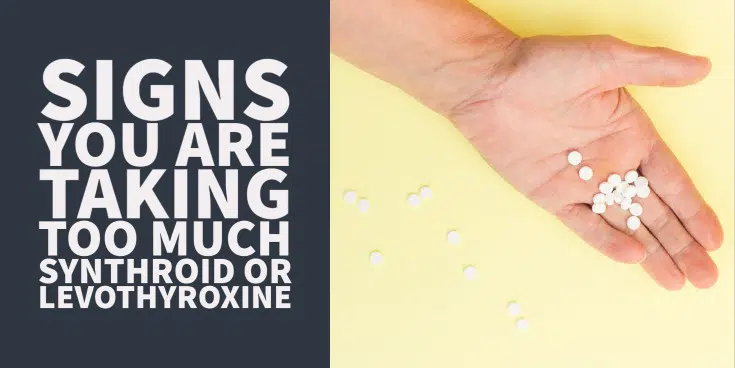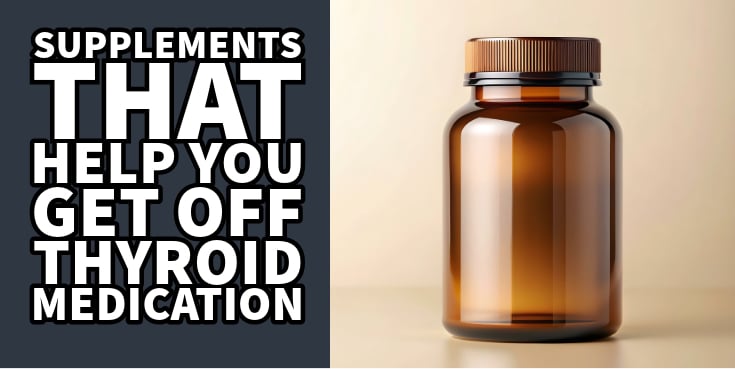Are you taking Synthroid and just not feeling quite right?
If so, there’s a possibility that you may be taking too much.
According to research, about 20-30% of all thyroid patients taking thyroid medication are taking more than they need at any given time.
That means there’s about a 2-3 out of 10 chance that you fall into that category!
That’s the bad news.
The good news is that fixing this problem is actually quite easy, which is exactly what we are going to be talking about today:
DOWNLOAD FREE RESOURCES
Foods to Avoid if you Have Thyroid Problems:
I’ve found that these 10 foods cause the most problems for thyroid patients. Learn which foods you should avoid if you have thyroid disease of any type.
The Complete List of Thyroid Lab tests:
The list includes optimal ranges, normal ranges, and the complete list of tests you need to diagnose and manage thyroid disease correctly!
Signs You Are Taking Too Much Synthroid
So how do you know if you are taking too much Synthroid?
The best and easiest way to determine is by looking at your symptoms.
Your body will tell you when something is wrong or off! All you have to do is listen.
If you are taking too much then you may experience some (or all) of these symptoms:
- Weight loss
- Heart palpitations
- Jittery sensation
- A feeling of warmth in your body
- Hair loss
- Tremors in your hands
- Anxiety
- Flushing of the skin
- Heat intolerance
- Loose stool or diarrhea
These are the most common signs that indicate your dose is too high, but, remember, thyroid hormone side effects occur on a sliding scale.
This means your symptoms may scale from minor to major, depending on how much more you are taking than you need.
As far as the more serious side effects go, that list includes:
- Osteoporosis or decreased bone density
- Heart enlargement
- Atrial fibrillation
- Chest pain
- Shortness of breath
If you experience any of these symptoms then you should seek medical care as soon as possible!
Fortunately, these side effects are quite rare and it’s unlikely that you will experience them because most people will go to their doctor long before they experience them.
If you are experiencing any of these symptoms then your next step will be to visit your doctor.
From there, he or she will most likely order a set of lab tests to confirm the diagnosis.
Thyroid Lab Tests That Indicate You Are Taking Too Much
If you are truly taking too much then you will most likely also see some changes in your lab tests.
I say most likely because there will always be some people who will experience the symptoms of excess Synthroid even at low doses which may not impact their lab tests.
So keep that in mind as you evaluate your symptoms.
But if you are like most people, then you will probably see the following changes to your thyroid lab tests:
- A Suppressed or low TSH – The more Synthroid you take, the lower your TSH will become. For those taking too much, they will experience either a low or suppressed TSH.
- High free T4 – Synthroid contains thyroxine (T4 thyroid hormone) so if you are taking too much, you may see this value increase.
- High free T3 – Because the body creates T3 from T4, it follows that if you are taking too much T4 then you may also see a high T3 as well. This is less common but it does occur.
Never just use your thyroid lab tests or just your symptoms to determine if you are taking too much.
Instead, you will get a much more accurate picture of your health if you use both.
What Are the Long-Term Dangers of Being Over-Dosed?
Some people prefer a slight overdose when it comes to their thyroid medication.
Why?
Because your thyroid helps to regulate your metabolism by turning on cellular function.
The more thyroid hormone you have the higher your metabolism will be, the more fat you will burn at rest, and the more energy you will have.
While this does sound appealing, it doesn’t come without a cost.
As you rev up the cellular machinery in your body you rev up more than just your fat-burning potential.
Increasing your thyroid dose also puts excess strain both on your bone density and on your heart tissue.
Using a consistently high dose of Synthroid puts you at an increased risk for developing osteoporosis (3) (decreased bone density) and heart conditions such as atrial fibrillation (4).
The absolute risk is not well defined and there are some studies that show that suppressing the TSH does NOT cause these conditions (5), but they are still important to consider for each person.
Even if your risk is increased for developing these conditions, though, doesn’t mean that you will ALWAYS experience them.
It may be that taking a higher dose of Synthroid increases your risk of both osteoporosis and atrial fibrillation, but the risk may only increase from say 1% up to 3-4% per person per year.
These numbers are made up (because we don’t actually know what they are), but these are plausible values based on my own experience and looking at the data.
How Long Does Synthroid Stay in Your System?
Synthroid, because it is a T4-only thyroid medication, has a half-life of around 5-7 days (6).
What does that mean?
It means that it will take 5 half-lives for this medication to be nearly completely eliminated from your system.
If you do the math (7 days x 5 half-lives) you find that Synthroid will be in your system for a total of about 35 days.
By the 35-day mark, you will most likely metabolize the majority of thyroid medication.
And by metabolism, I mean that your body will basically use up all of that thyroid hormone for cellular function.
This is both good and bad.
Bad in the sense that if you take too much thyroid medication it may remain in your system for a long period of time and good in the sense that if you miss a dose here or there it’s probably not going to affect you because you have a significant amount built up in your system.
But it’s important to note that just because it’s in your system for 35 days doesn’t mean that it will be equally potent throughout all of those days.
For instance:
Around day 17-18 the concentration of Synthroid will be about half of what you took originally.
Finding Your Optimal Dose of Synthroid
So how are you supposed to find your optimal dose of Synthroid?
The answer that most people look to is their thyroid lab tests.
And this is a great starting point, but it’s not sufficient by itself.
Most people, when they look at their thyroid lab tests, focus solely on the TSH as a marker of thyroid function.
And while the TSH is a potentially great marker, it’s not perfect and it shouldn’t be the only thing you look at.
More valuable measurements may be found by evaluating your free thyroid hormone concentrations.
And by free thyroid hormone levels, I am referring to both Free T3 and Free T4.

These markers tell you exactly how much thyroid is floating around in your bloodstream and give you an idea if you are absorbing and utilizing the Synthroid you are taking by mouth.
If you focus only on the TSH you miss the information provided by looking at these levels.
The TSH only gives you information about your pituitary gland (7) and it doesn’t give you information about the absolute levels of free thyroid hormone levels in your body.
But beyond your free thyroid hormone levels, you also want to look at one other very important factor…
Your symptoms!
In other words:
How are you feeling? Are you noticing an improvement in the symptoms that brought you to the doctor in the first place? Are you feeling any better? Is your weight normalizing? Is your hair loss slowing down?
All of these questions are things that you should be thinking about as you alter your dose!
As you alter your dose of Synthroid you should feel BETTER, not worse.
As you do these things (evaluate both your free thyroid hormone levels and your symptoms) you will find your optimal dose.
What to do if you are Experiencing Overdose Symptoms
The good news is that overdose symptoms can be easily solved by adjusting your dose of Synthroid.
I don’t recommend that you make any changes to your Synthroid dose without first consulting your doctor, but the answer to solving your issue is usually as easy as reducing your total dose.
Let’s use this as an example:
Say that you are taking 100mcg of Synthroid each day.
Previously you were taking 75mcg per day and feeling pretty good, but once you started taking the 100mcg dose you started to notice increased hair loss, heart palpitations, a jittery feeling, and some anxiety.
You also found that your TSH was low and your free T4 was high after thyroid blood testing.
This is a pretty classic example of Synthroid overdosing.
So what do you do?
The most obvious answer is to reduce your dose back to where you felt “normal” which would be around 75mcg of Synthroid each day.
Not all cases are this clear-cut, but this is the logic that you should apply to your situation.
In reality, you may find that you need slightly more than 75mcg but less than 100mcg and you might find that your ideal dose is really closer to 88mcg per day.
This can be teased out as you evaluate your lab tests and as you follow your symptoms.
What if you Accidentally Double or Triple your Normal Dose of Synthroid?
In most cases, this won’t be a huge deal (8).
You may feel jittery or anxious for about a week or so, but the side effects should fade rapidly over a few days.
If you take an excessively high dose you may be tempted to compensate by reducing your dose the next few days, but this isn’t actually a good idea.

It’s best not to play chemist when it comes to your medications and instead stick to your regular program as if the change in your dosing didn’t happen.
By adding more complexity to your dosing equation (by skipping other doses) you risk causing more side effects down the road which can confound and confuse you further.
If after taking a high dose you are experiencing symptoms that are troublesome then you can reach out to your Doctor.
In some cases, they may want you to use a medication known as a beta-blocker which can help reduce the side effects you are experiencing.
Even if you take a high dose of Synthroid in 1 day, the consequences should not be long-lasting or severe.
Conclusion
Synthroid is an incredibly common medication that is prescribed for treating hypothyroidism and Hashimoto’s thyroiditis.
Because it is so commonly used, the percentage of people who temporarily take too much medication is quite high!
The good news is that in most cases, the side effects and consequences are not severe and should fade on their own over a period of a few days.
Synthroid has a half-life of about 5-7 days which means that it is normally eliminated entirely from your system in about 30-35 days.
You can treat overdose symptoms usually by simply reducing your dose of thyroid medication.
Also, you can find your optimal dose of Synthroid by evaluating both your thyroid lab tests and by keeping an eye on your symptoms.
Now I want to hear from you:
Are you suffering from Synthroid overdose symptoms?
What dose are you currently taking?
Do you feel your dose is too high or too low?
Leave your questions or comments below!
Scientific References
#1. https://www.ncbi.nlm.nih.gov/pubmed/16807224
#2. https://www.ncbi.nlm.nih.gov/pmc/articles/PMC2449048/
#3. https://www.ncbi.nlm.nih.gov/pmc/articles/PMC3930806/
#4. https://www.ncbi.nlm.nih.gov/pmc/articles/PMC1681414/
#5. https://www.ncbi.nlm.nih.gov/pubmed/8252740
#6. https://www.ncbi.nlm.nih.gov/pubmed/26594730
#7. https://www.ncbi.nlm.nih.gov/books/NBK499850/
#8. https://www.ncbi.nlm.nih.gov/pmc/articles/PMC5537213/








